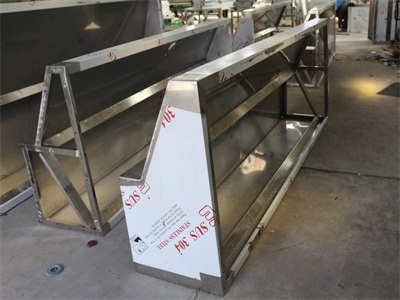濟(jì)南廚房安裝煙幕安裝的障礙已被,地面無(wú)阻礙施工的雜物情況。具有重量輕、強(qiáng)度高、無(wú)燃燒、隔音、隔熱、防潮、耐水、使用壽命長(zhǎng)等特點(diǎn),是新一代、的綠色產(chǎn)品。玻璃鎂復(fù)合風(fēng)管主要應(yīng)用于建筑、裝飾、消防等領(lǐng)域,特別適用于餐廳、酒店、等擁擠場(chǎng)所的裝飾,以及地下室、人防、礦山等潮濕環(huán)境工程。
The obstacles to installing smoke curtain in Jinan kitchen have been cleared, and the ground has no obstruction to the construction of debris. It has the characteristics of light weight, high strength, no combustion, sound insulation, heat insulation, moisture proof, water resistance, long service life and so on. It is a new generation of energy-saving and environmental protection green products. Magnesium glass composite duct is mainly used in building, decoration, fire protection and other fields, especially in restaurants, hotels, shopping malls and other crowded places, as well as basement, civil air defense, mines and other humid environmental engineering.
廚房排氣應(yīng)避免大量空調(diào)空間中的空氣被抽走。應(yīng)避免使用自然通風(fēng)和機(jī)械通風(fēng)。自然通風(fēng)和機(jī)械通風(fēng)都應(yīng)考慮新鮮空氣的路徑,避免死氣沉沉的區(qū)域,以便于抽排室內(nèi)污染空氣。機(jī)械送風(fēng)應(yīng)通過(guò)風(fēng)管和送風(fēng)口進(jìn)行。管道系統(tǒng)不應(yīng)復(fù)雜,應(yīng)避免局部風(fēng)速。新風(fēng)補(bǔ)充量應(yīng)占排風(fēng)量的70%-80%。
Kitchen exhaust should avoid a large amount of air in the air-conditioned space being pumped away. Natural ventilation and mechanical ventilation should be avoided. Natural ventilation and mechanical ventilation should consider the path of fresh air to avoid dead areas, so as to facilitate the extraction of indoor polluted air. Mechanical air supply shall be carried out through air ducts and air outlets. Pipeline system should not be complicated and local wind speed should be avoided. Fresh air supply should account for 70-80% of the exhaust air.
由于廚房的結(jié)構(gòu)和廚房在建筑中的位置不同,有條件的廚房應(yīng)由建筑的空調(diào)系統(tǒng)有序地提供。但今天遇到的大多數(shù)情況是沒(méi)有廚房空氣供應(yīng)系統(tǒng)的建筑。很多有餐廳、廚房等的建筑,只設(shè)計(jì)了集中供暖系統(tǒng),沒(méi)有集中空調(diào)系統(tǒng)。當(dāng)廚房處于工作狀態(tài)時(shí),排氣系統(tǒng)投入運(yùn)行,廚房處于負(fù)壓狀態(tài)。新鮮空氣的來(lái)源包括室外新鮮空氣的滲透和從餐廳到廚房的大量空氣。
Because the structure of the kitchen is different from the position of the kitchen in the building, the conditional kitchen should be provided orderly by the central air conditioning system of the building. But most of today's situations are buildings without kitchen air supply systems. Many buildings with restaurants, kitchens and so on have only designed central heating system, but no central air conditioning system. When the kitchen is in working state, the exhaust system is put into operation, and the kitchen is in negative pressure state. The sources of fresh air include the infiltration of outdoor fresh air and the large amount of air from restaurant to kitchen.

廚房里的空調(diào)壞了。通過(guò)提取少量的空調(diào)空氣從前面大廳讓廚師在風(fēng)中浴直接在噴嘴的形式,它可以改善糟糕的工作環(huán)境造成的高溫在廚房里夏天的烘烤爐。局部排煙消防管的設(shè)計(jì)考慮了車(chē)間內(nèi)有害氣體、蒸汽、粉塵的分布情況,主要采用局部排煙系統(tǒng)將室外空氣從源頭直接排放。
The air conditioner in the kitchen is broken. By extracting a small amount of air-conditioned air from the front lobby to allow the chef to bathe directly in the form of a nozzle in the wind, it can improve the high temperature caused by poor working conditions in the kitchen in summer baking oven. The distribution of harmful gases, vapors and dust in the workshop is considered in the design of local smoke exhaust fire hose. The outdoor air is directly discharged from the source by the local smoke exhaust system.
局部排氣系統(tǒng)由局部排氣罩、消防排煙管、通風(fēng)機(jī)、粉塵或有害氣體凈化設(shè)備和排氣裝置組成。當(dāng)有害氣體、蒸氣或粉塵較大的工件,而不是方舟在廢氣處理,可以使用一側(cè)打開(kāi),臉部其他部位封邊排氣罩,或各方不能關(guān)閉排氣罩,或上排氣罩、排氣,兩國(guó)單方面排氣和吸氣槽邊吹排氣一切形式。
The local exhaust system consists of a local exhaust hood, a fire exhaust pipe, a ventilator, a dust or harmful gas purification device and an exhaust device. When hazardous gas, vapor or dust is larger than the ark in the exhaust gas treatment, you can use one side to open, the other parts of the face to seal the exhaust hood, or the parties can not close the exhaust hood, or the upper exhaust hood, exhaust, unilateral exhaust and suction tank side blowing all forms of exhaust.
上一篇:高溫風(fēng)管和工業(yè)耐磨軟管的區(qū)別!
下一篇:多葉送風(fēng)口的配件有哪些?



